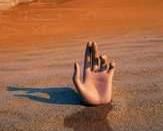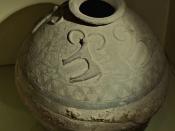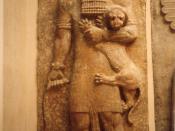Gilgamesh was the first surviving epic poem which was originally written on twelve clay tablets, in a set of symbols called cuneiform near or around 2000 BC. This heroic poem was named after the hero, King Gilgamesh. Gilgamesh was a tyrannical Babylonian king who ruled the city of Uruk. His father was mortal and his mother was a goddess making him 2/3 god and 1/3 man. He had special powers of a god but was also mortal and will one day face death.
Gilgamesh was a wise and courageous king who saw mysteries and knew secret things. Although Gilgamesh was a strong leader, he was also terrifying as well. The people of Uruk talked about Gilgamesh, for he was overpowering and had the first right to engage in sexual relations with virgins and break up families. Gilgamesh showed the people of Uruk no compassion. Because of this, the people called out to the sky god, Anu for help.
With the help of the god, Enkidu was created as Gilgamesh's equal. The gods made him of clay, and he came into life in the wilderness. He ate grass and drank the water with the animals. Enkidu was freeing the animals from the traps and because of this, the trapper asked his father what to do. His father encourages him to go to the city and take one of the harlots back with him to the forest. The harlot's job is to offer herself sexually to Enkidu so he loses his wildness and gains understanding and knowledge. The harlot teaches Enkidu ways of civilization and tells him about Gilgamesh.
Before Enkidu goes to the city, Gilgamesh has two dreams. The first dream is about a meteorite that falls to earth and Gilgamesh can neither lift nor turn it. His second dream is...


